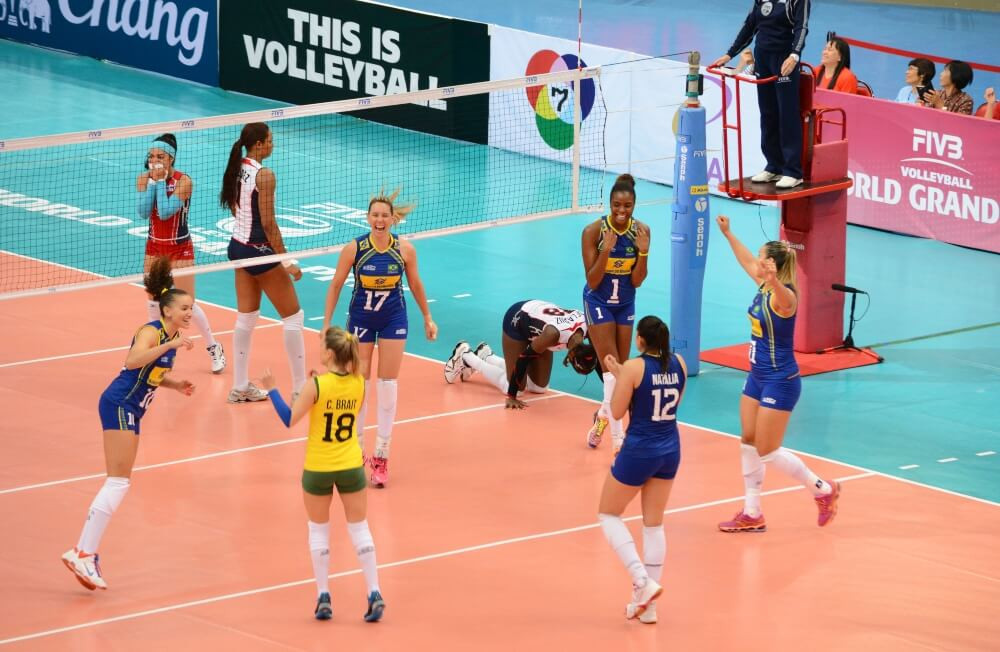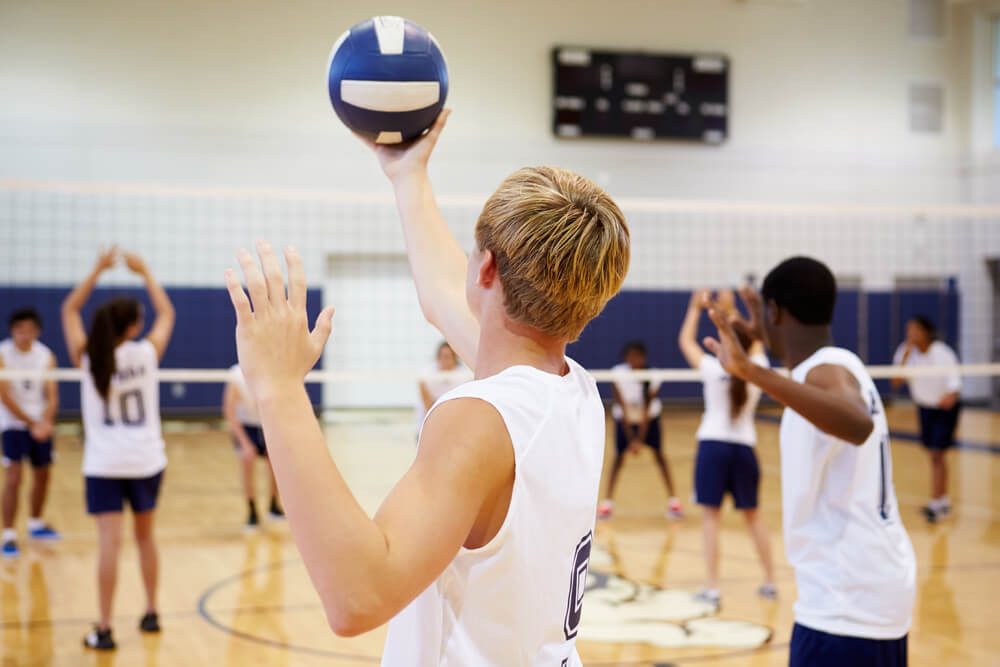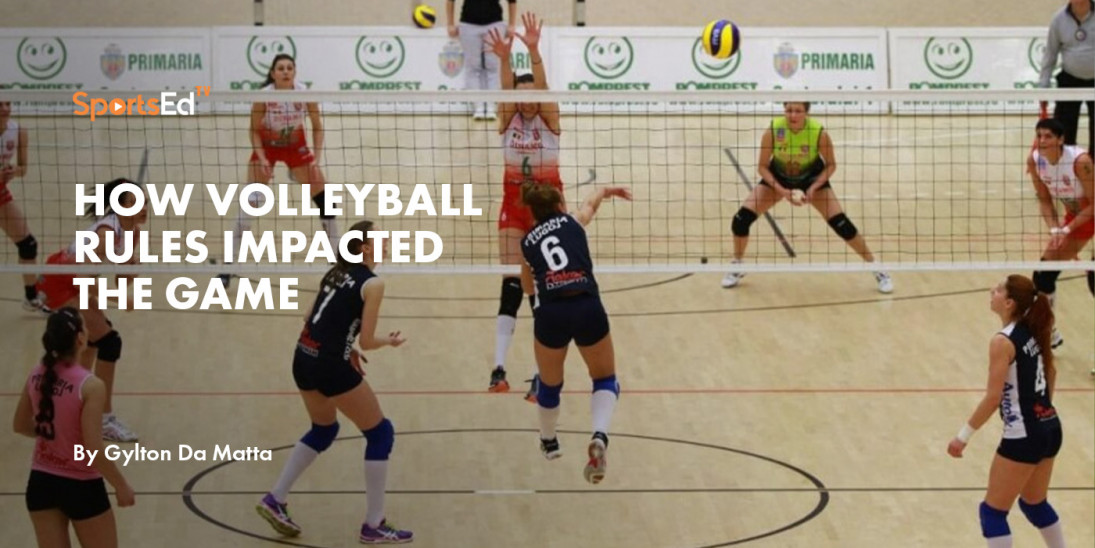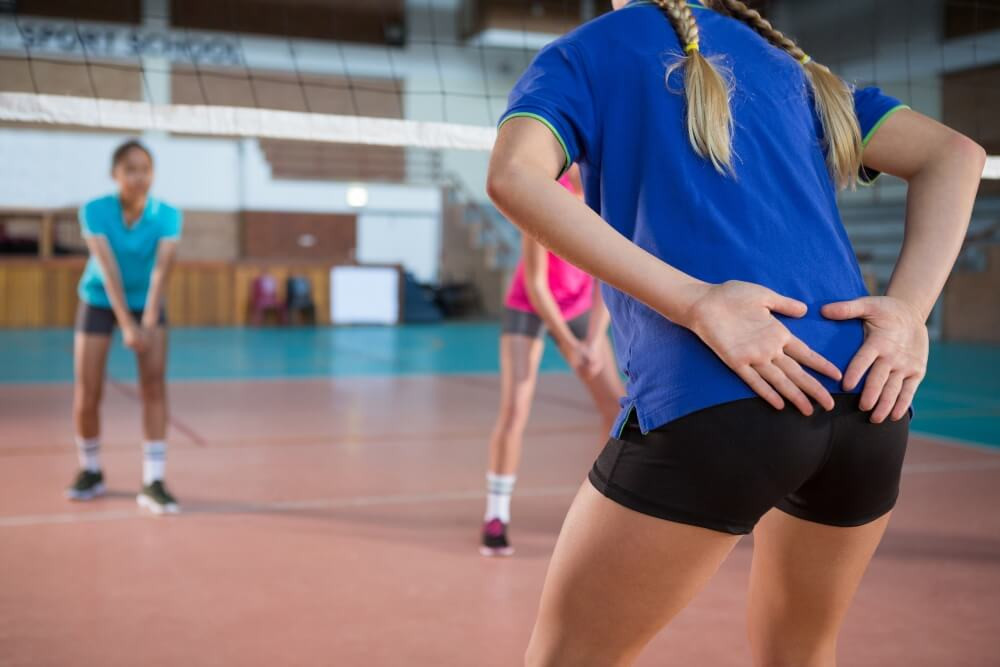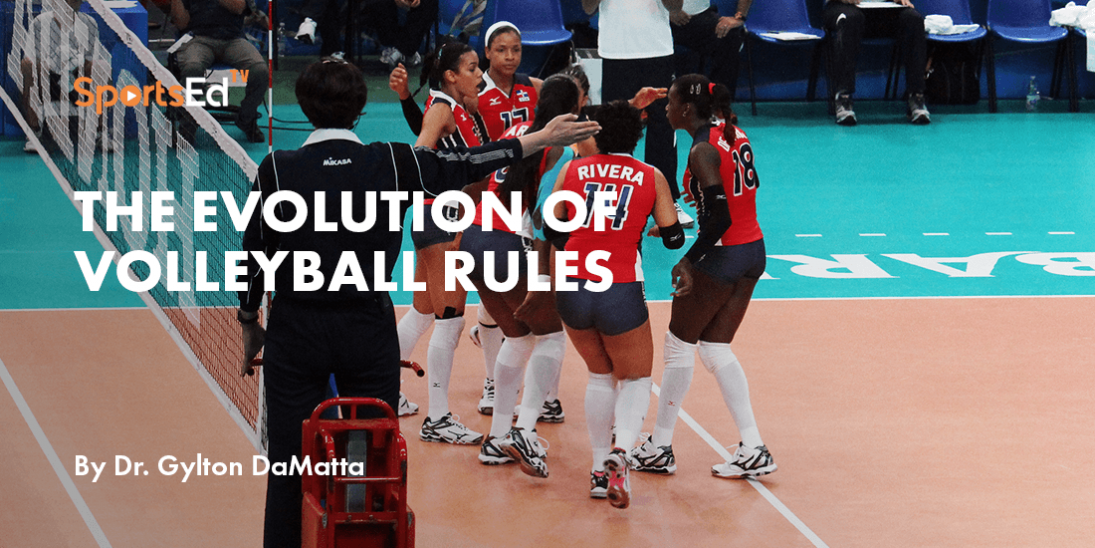Volleyball
Welcome and thanks for visiting...

A Billion Reasons…Volleyball in the XXI Century!
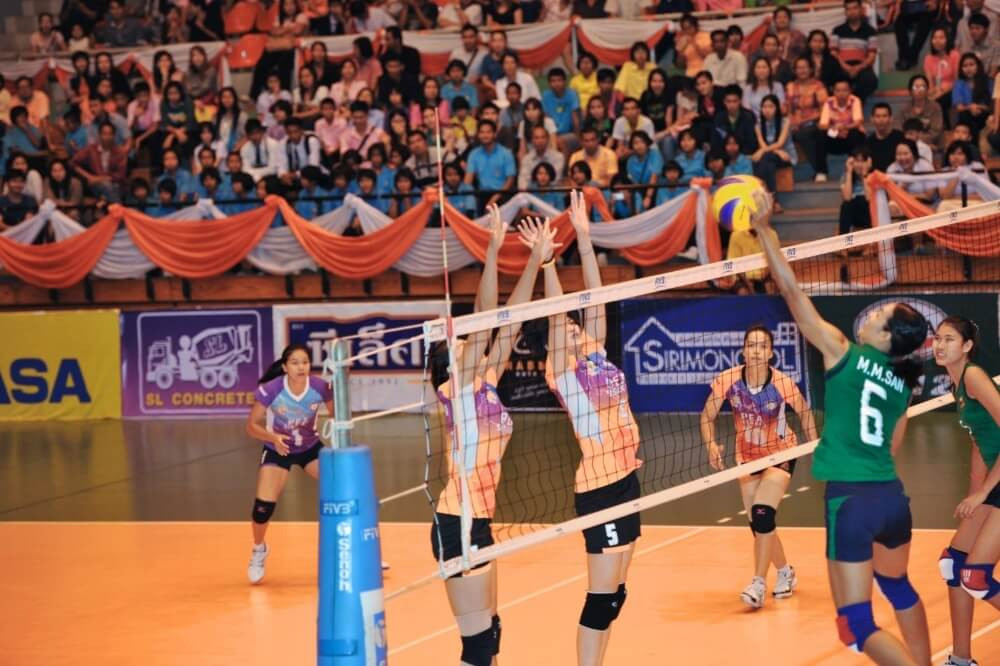
It does not matter when nor where; volleyballers are passionate! It does not matter if they are playing in the Olympics or in their backyards…volleyball players love playing volleyball passionately.
In this reflection, we want to learn from those who share the same passion that we do! All over the world it is estimated that 1 billion people are involved with volleyball. We need to serve and provide these people solid information about what is volleyball, how to play it properly, who we play with and why we play.
Volleyball manifests culturally through so many different modalities such as indoor, beach and sitting volleyball. It is very important also to address all variations of the sport in its cultural expressions such as 1 v 1, 2 v 2, 3 v 3, 4 v 4 and 6 v 6 played in snow, sand, mud, coed, as soccer-style footvolley, with one-touch only and recreationally in all different shapes and with all different rules.
Volleyball is a democratic, inclusive and universal sport in which young, adults, old people, gay, straight, and people from all countries, all faiths and all religion participate systematically and with great enthusiasm. In order to exercise the right to play sports (in this case volleyball) we need to learn from expert coaches and players through an honest dialogue about volleyball and about the importance of participating in volleyball for a lifetime!
It is predicted that by the end of the next Olympic Games 1 out of 7 people in the world will be volleyball players.
Here, I offer a practical reflection about coaching expertise, player development and healthy participation in the volleyball lifestyle. It’s presented simply encouraging readers to participate dynamically in practices, games and competitions that will empower, socialize and encourage a healthy active lifestyle.
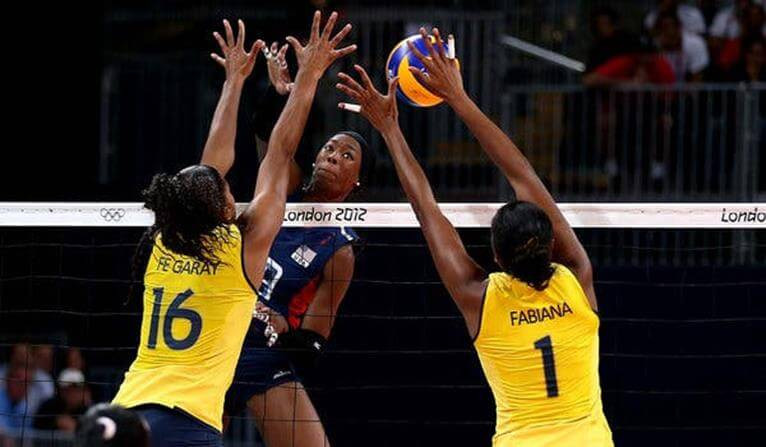 |
| Figure 1: Photo of attacker Hoocker from USA on the net with Fernanda Garay and Fabiana Coutinho. By Dr. Da Matta from London 2012. Technical Evaluation FIVB 2016 |
In order to address all of these issues, I have decided to produce a book, on Volleyball Expertise in the XXI Century. My role as an editor will be of a facilitator, and I will focus my writing approach from the perspective that we learn, play and practice volleyball for a lifetime.
I will collaborate with each contributing author to bring open sources and theoretical support to their writings while also reflecting with the authors about ways to bring to the surface the underlying issues such as knowledge expertise, social justice, social integration and inclusion.
In the XXI Century, it is important that we define who we are as educators and on what side of the history we stand. For instance, sports are, what we make of it! So, each club director or sports manager needs to reflect on some critical questions:
- Do players or coaches in your program come from minority and underrepresented groups?
- Are they poor or come from underprivileged backgrounds? And, how are they treated?
- In which way does your team or program bring values such as inclusion, gender equity or women’s empowerment to the day-to-day decision of your management?
- How much to you pay a person of color, a Latinx professional versus a person who is privileged? And what is your role is the grand scheme of sports justice and ethics?
I strongly believe these simple questions identify best practices in which we construct ideas of a model including fairness, respect and humanity, and disseminate this model all over the world.
Having spent considerable time researching, when it is appropriate, I will share a little of what I have learned, but it does not mean that what I say fits your needs or that it is the whole truth! Each one us, (teachers, coaches and instructors) have our own history, memory, and identity. We have our own reality as a coach, and I want to respect that fact, also, in the domain of volleyball expertise!
Administrators, parents, coaches and player are all together in a very important mission to make volleyball a tool that will elevate our communities and our citizens to enjoy a better quality of life through a healthier, more educational and more meaningful sports experience!
There is no right or wrong! But we need to reflect upon the many injustices that exist and shed powerful light at them.
This essay is a professional reflection for people who live volleyball every day! This forum of ideas represents values, standards and characteristics of volleyball for the XXI century that resonates with me from attending dozens of international conferences and sporting events, and most recently dozens of live conferences via Internet. It reflects best practices from experts in order to advance the quality of teaching volleyball in our clubs, schools and in our countries.
Purposefully, at the end of this “chapter”, we will have lots of questions like: What is volleyball? How do we teach volleyball? And most importantly, why do we do what we do?
What, How and Why will be our motto! For whom will be the challenging inquiry.
If at the end of the day, participants leave our volleyball courts and gyms with lots of questions, perhaps more than ever, we will have begun to accomplish our mission.
I will point out that inclusion and equity represent two major challenges for volleyball in the XXI Century. And now, as I write, we are facing a world COVID-19 pandemic that has disturbed all professional leagues and conferences across the globe. I also need to address that the USA will be one of the focus of analyses, not because it is the birthplace of volleyball, but because Collegiate Athletics represents a unique phenomenon with more than 5,000 volleyball teams organized around educational contexts.
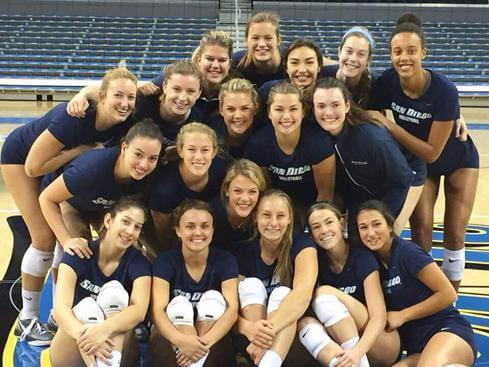 |
| Figure 2: The joy and happiness of the University of San Diego – Women’s Volleyball 2019 |
While the world has shut-down due to the Corona Virus Pandemic, once again, a new paradigm will dictate what is essential and what is not? What is useful or a priority and what is not?
As Black Lives Matter, Sports matter, too and encourage inclusivity, equity and diversity.
We have learned that we need to use sports’ real essence, transforming schools of intellect into schools for the whole person! Sports help eradicate racism, sexism, discrimination of all sorts and should share front stages of our societies.
In the past four months, more than three trillion of dollars have been allocated to pay for the impact of the COVID pandemic, only in the United States. Across the globe, the amount of resources allocated to develop a vaccine and to create a new health system is very much needed.
Peace, education, economics, health and social justice have emerged as critical 2020 topics.
Regrettably, allocation of resources to research sports and education seems to be a secondary priority. This has been true since early 80’s. Although the technological advancement has blossomed the fine arts, sports, music and entertainment has not received much attention from the scientific investigation standpoint.
In every four years, the world stops to see the Olympics as an event that epitomizes human achievement. Inspired by the Ancient Games, the mega-event is today a showcase of procedural expertise and a social justice forum for humanities through sports. The commercialization of the Games hinders the process of expertise development and the nuances of simple citizens (rich or poor, black and white, Muslims or Buddhists, gay or straight, etc.) to participate in sports and one day to become a gold medalist.
Some teams and players have consistently strode the path to success yet, we still know little of the lives of expert athletes, who travel the extraordinary journey to become exceptional.
Each country in the world has its own way of implementing their expertise identification, development, retention and sustainability. But, until today, we know very little about our top experts from a realistic perspective and from the reports/voices of our very own protagonists of this phenomenon - the volleyball players themselves!
I have spent almost 20 years, collecting data, interviewing and writing analyses about the lived experiences of volleyball experts. From a subjective and personal standpoint, what have we learned with this COVID19 pandemic?
- Certainly, we have learned that people will continue to play volleyball.
- Volleyball will grow by people playing outdoors.
- Beach volleyball, grass volleyball, volleyball at the roof of buildings will explode.
- The number of players will decrease from 6 v 6 perhaps to 3 v 3 or 2 v 2.
- The old coaching style will be switched by science in volleyball.
- The more children will engage in screen the more need they will have to be active.
- Although it is possible to work remotely, it is inevitable to play virtually.
- We will never be the same after this Pandemic.
In the XXI Century, pluralism, diversity, health issues, economics, environmental events, advancement of technology, search for social justice and citizenship will be some of the major factors that might change how we promote, perceive and conceptualize volleyball.
The literature has anecdotal evidence that the discrimination against minorities such as Latino indigenous, and people of color is a reality across many sports and in volleyball this is not different. We also understand that such discriminatory practices happen through institutionalized racism but also due to ignorance.
Meanwhile, at the elite level, expert coaches claim the need for sports (men’s and women’s volleyball) to be more inclusive not due the moral imperative but due the fact that some of the most talented athletes express their expertise based on their skills and psychological traits, not through appearance nor through the color of their skins but through their skills.
Finally, I want to ask each reader/participant to think about the things that each one really needs to improve in their coaching, and we will have a fun and honest conversation about our challenges, problems and celebrate the wonderful things we do as volleyball players, coaches and parents!

